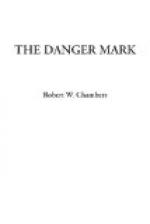All these were very great men; but they and Colonel Mallett journeyed at intervals into the presence of a greater man who inhabited, all alone, except for a crew of a hundred men, an enormous yacht, usually at anchor off the white masonry cliffs of the seething city.
All alone this very great man inhabited the huge white steamer; and they piped him fore and they piped him aft and they piped him over the side. Many a midnight star looked down at the glowing end of his black cigar; many a dawn shrilled with his boatswain’s whistle. He was a very, very great man; none was greater in New York town.
It was said of him that he once killed a pompous statesman—by ridicule:
“I know who you are!” panted a ragged urchin, gazing up in awe as the famous statesman approached his waiting carriage.
“And who am I, my little man?”
“You are the great senator from New York.”
“Yes—you are right. But”—and he solemnly pointed his gloved forefinger toward heaven—“but, remember, there is One even greater than I.”
Duane had heard the absurd lampoon as a child, and one evening late in August, smoking his after-dinner cigar beside his father in the empty conservatory, he recalled the story, which had been one of his father’s favorites.
But Colonel Mallett scarcely smiled, scarcely heard; and his son watched him furtively. The trim, elastic figure was less upright this summer; the close gray hair and cavalry mustache had turned white very rapidly since spring. For the first time, too, in all his life, Colonel Mallett wore spectacles; and the thin gold rims irritated his ears and the delicate bridge of his nose. Under his pleasant eyes the fine skin had darkened noticeably; thin new lines had sprung downward from the nostrils’ clean-cut wings; but the most noticeable change was in his hands, which were no longer firm and fairly smooth, but were now the hands of an old man, restless if not tremulous, unsteady in handling the cigar which, unnoticed, had gone out.
They—father and son—had never been very intimate. An excellent understanding had always existed between them with nothing deeper in it than a natural affection and an instinctive respect for each other’s privacy.
This respect now oppressed Duane because long habit, and the understood pact, seemed to bar him from a sympathy and a practical affection which, for the first time, it seemed to him his father might care for.
That his father was worried was plain enough; but how anxious and with how much reason, he had hesitated to ask, waiting for some voluntary admission, or at least some opening, which the older man never gave.
That night, however, he had tried an opening for himself, offering the old stock story which had always, heretofore, amused his father. And there had been no response.
In silence he thought the matter over; his sympathy was always quick; it hurt him to remain aloof when there might be a chance that he could help a little.




